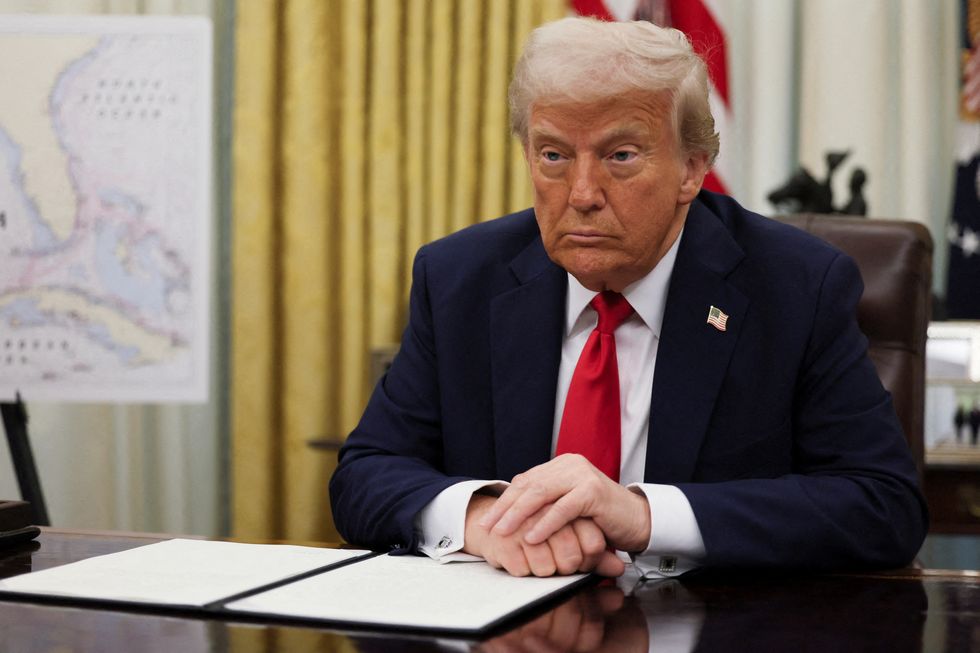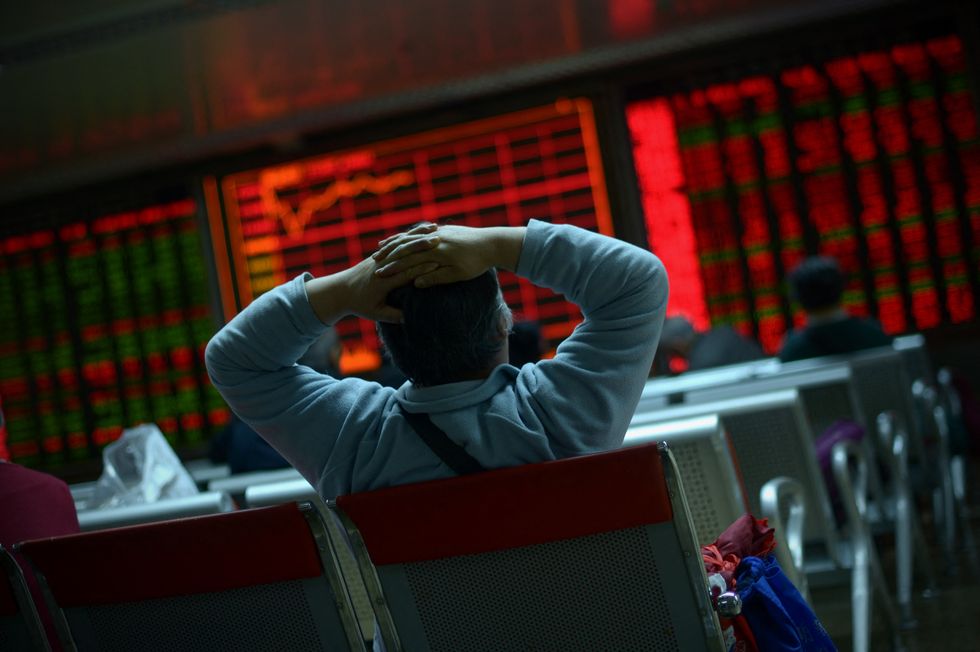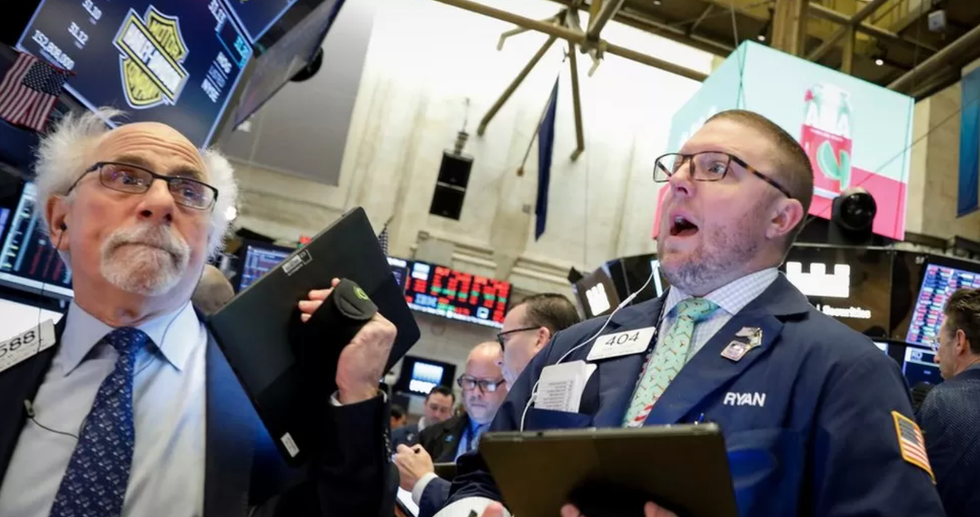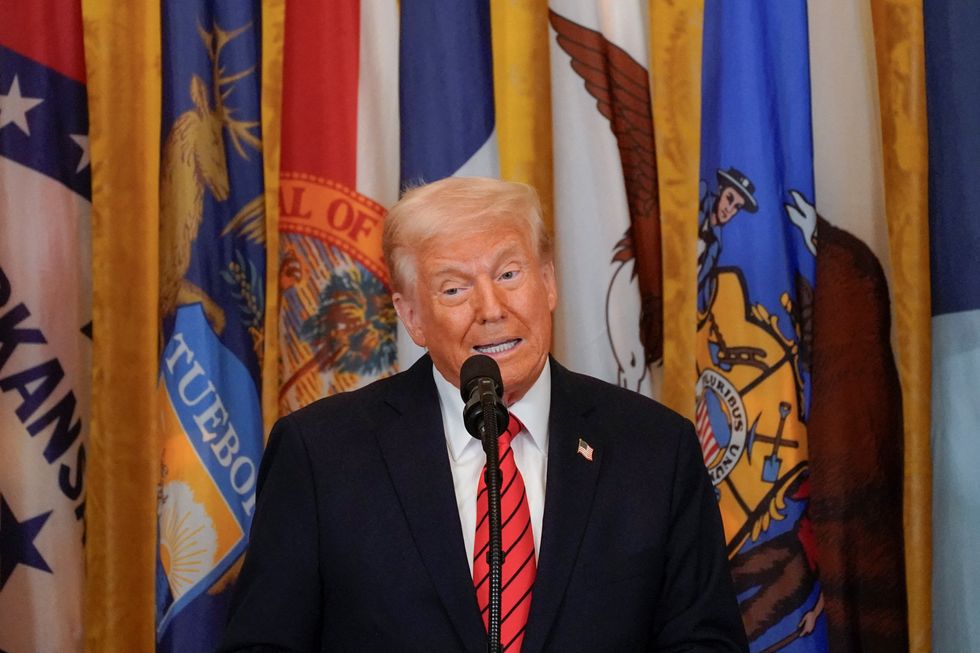Holly Bishop
Guest Reporter
Global markets tumbled on Wednesday as investors braced for US President Donald Trump's imminent tariff announcement, dubbed "Liberation Day".
Wall Street indices fell with the S&P 500 and Nasdaq Composite both sliding 0.2 per cent, whilst the Dow Jones Industrial Average dropped 55 points.
Safe-haven gold hovered near record highs as fears mounted that an intensifying global trade war could trigger a sharp economic slowdown.
Trump's "reciprocal tariffs" are set to be unveiled at a Rose Garden event and will "be effective immediately", according to a White House statement on Tuesday.

The tariffs will reportedly "start with all countries", though specific details remain scarce.
The announcement is scheduled for 8.00pm GMT on what Trump has styled as America's "Liberation Day".
Tesla shares weighed heavily on the broader market, losing about 3 per cent after reporting disappointing first-quarter deliveries.
The market volatility comes as stocks have been under pressure for weeks, with the S&P 500 down five out of the past six weeks amid growing tariff uncertainty.
“The whole market is on edge waiting to get a sense of how bad the tariff war may be and how much damage could be coming for the economy and corporate profits,” said Yung-Yu Ma, chief investment officer at BMO Wealth Management.
Some investors, however, believe the recent sell-off may be overdone.
LATEST DEVELOPMENTS:

Treasury Secretary Scott Bessent told lawmakers that Wednesday's duties will serve as a "cap", with the announced tariffs being the highest amount set.
This would give countries opportunity to take steps to reduce the tariff amount.
The Washington Post reported the White House was considering imposing tariffs of roughly 20 per cent on most imports, though several options remain under consideration.
Business leaders are quickly losing optimism about the US economy and their own companies, according to Apollo chief economist Torsten Slok.
"Surveys of CEOs and CFOs show that corporate confidence has declined in recent months," Slok said in a blog post.
The CEO Confidence Index shows outlook one year from now at its lowest level in more than a decade.
CFOs have similarly grown more pessimistic about both their companies and the national economy.
European markets also felt the pressure, with the STOXX 600 benchmark falling 1.1 per cent led by declines in pharmaceutical stocks.


Various measures of volatility edged up as traders rushed to secure short-term hedges against price swings across financial markets.
"Whatever's announced today, I doubt very much will be the framework that's in place in, say, nine months' time because we know there'll be negotiations around this," said Daiwa Capital economist Chris Scicluna.
Beyond the tariff news, investors are increasingly worried by signs of rising prices and slowing growth.
Data showed US manufacturing contracted in March after growing for two straight months.
A measure of inflation at the factory gate jumped to the highest level in nearly three years amid rising anxiety over tariffs on imported goods.
US job openings fell in February by 194,000 to 7.568 million as uncertainty surrounding tariffs squelched labour demand.
The yield on benchmark US 10-year Treasury notes fell to 4.14 per cent, its lowest level since early March.
Currency markets remained relatively muted, with the euro steady at $1.0801 and sterling at $1.2943.
"We head into Trump's moment to shine with many having already deleveraged to run as flat or neutral a position as they can in equity, the USD and Treasuries," said Chris Weston, head of research at Pepperstone.
Find Out More...
Wall Street indices fell with the S&P 500 and Nasdaq Composite both sliding 0.2 per cent, whilst the Dow Jones Industrial Average dropped 55 points.
Safe-haven gold hovered near record highs as fears mounted that an intensifying global trade war could trigger a sharp economic slowdown.
Trump's "reciprocal tariffs" are set to be unveiled at a Rose Garden event and will "be effective immediately", according to a White House statement on Tuesday.

The tariffs will reportedly "start with all countries", though specific details remain scarce.
The announcement is scheduled for 8.00pm GMT on what Trump has styled as America's "Liberation Day".
Tesla shares weighed heavily on the broader market, losing about 3 per cent after reporting disappointing first-quarter deliveries.
The market volatility comes as stocks have been under pressure for weeks, with the S&P 500 down five out of the past six weeks amid growing tariff uncertainty.
“The whole market is on edge waiting to get a sense of how bad the tariff war may be and how much damage could be coming for the economy and corporate profits,” said Yung-Yu Ma, chief investment officer at BMO Wealth Management.
Some investors, however, believe the recent sell-off may be overdone.
LATEST DEVELOPMENTS:
- Starmer scrambles 'concession package' as PM pleads Trump to spare Britain from trade war
- 'Why were we not prepared?!' Ellie Costello GRILLS Bridget Philipson on Donald Trump's trade war
- Trump's tariffs 'knock out' Reeves's £10bn headroom just ONE WEEK after crippling cuts

Treasury Secretary Scott Bessent told lawmakers that Wednesday's duties will serve as a "cap", with the announced tariffs being the highest amount set.
This would give countries opportunity to take steps to reduce the tariff amount.
The Washington Post reported the White House was considering imposing tariffs of roughly 20 per cent on most imports, though several options remain under consideration.
Business leaders are quickly losing optimism about the US economy and their own companies, according to Apollo chief economist Torsten Slok.
"Surveys of CEOs and CFOs show that corporate confidence has declined in recent months," Slok said in a blog post.
The CEO Confidence Index shows outlook one year from now at its lowest level in more than a decade.
CFOs have similarly grown more pessimistic about both their companies and the national economy.
European markets also felt the pressure, with the STOXX 600 benchmark falling 1.1 per cent led by declines in pharmaceutical stocks.


Various measures of volatility edged up as traders rushed to secure short-term hedges against price swings across financial markets.
"Whatever's announced today, I doubt very much will be the framework that's in place in, say, nine months' time because we know there'll be negotiations around this," said Daiwa Capital economist Chris Scicluna.
Beyond the tariff news, investors are increasingly worried by signs of rising prices and slowing growth.
Data showed US manufacturing contracted in March after growing for two straight months.
A measure of inflation at the factory gate jumped to the highest level in nearly three years amid rising anxiety over tariffs on imported goods.
US job openings fell in February by 194,000 to 7.568 million as uncertainty surrounding tariffs squelched labour demand.
The yield on benchmark US 10-year Treasury notes fell to 4.14 per cent, its lowest level since early March.
Currency markets remained relatively muted, with the euro steady at $1.0801 and sterling at $1.2943.
"We head into Trump's moment to shine with many having already deleveraged to run as flat or neutral a position as they can in equity, the USD and Treasuries," said Chris Weston, head of research at Pepperstone.
Find Out More...
